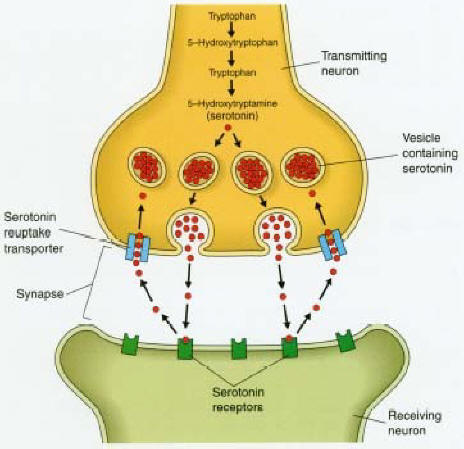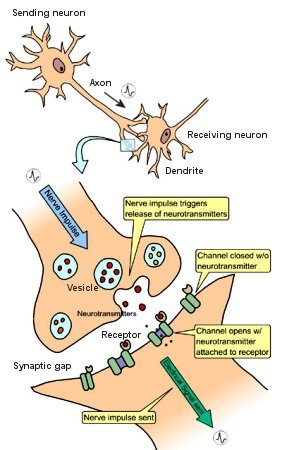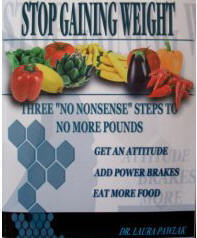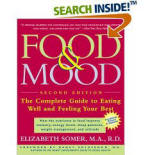Understand Food Cravings, Brain Chemistry, Body Weight and Your Health
You
BECOME what you think, what you eat, and what you do!

Consider about how your lifestyle patterns, food choices, self-nurturing, and physical activity choices deeply influence your brain chemistry, your moods, addictive urges, your sense of well being, and ultimately your body weight.


Many brain neurotransmitters and nutrients in foods affect appetite and moods
Aside from providing great pleasure and enjoyment, the nutrients and energy your body needs to function; food also has an influence on appetite and moods. Research shows that certain foods and lifestyle patterns affect powerful mood-modifying brain chemicals called neurotransmitters:
- Serotonin — this is a chemical released after eating carbohydrates (sugars and starches). It enhances calmness, improves mood, and lessens depression. Serotonin is made from the amino acid tryptophan. High levels of serotonin help control appetite, satisfy cravings, and provide a feeling of well-being and inner calm.
- Dopamine and norepinephrine — these are chemicals released after eating protein (meats, poultry, dairy, legumes). They enhance mental concentration and alertness. These neurotransmitters come from the amino acid tyrosine.
- Ghrelin — a neurotransmitter that sets up an irresistible urge to eat when elevated
- NPY, neuropeptide Y — increases carbohydrate cravings when elevated
- Galanin — increases the desire for fatty foods when elevated
- Cortisol — the emergency gland of the body, the adrenals releases cortisol as the primary coordinator for the reactions of stress. Cortisol decreases the production of serotonin. If you normally eat to relieve stress, the hormone cortisol places the extra calories (fat) in the abdomen or stomach area of your body.
- Endorphins — the body’s natural “high'" which gives pain relief and pleasure when elevated
How Do Your Lifestyle, Food Choices, and Thinking Habits Affect Your Brain Chemistry?


ü As you lower calories to lose weight, you starve your brain first and that depletes serotonin (a neurotransmitter which helps you feel calm, peaceful, and contented, and has a pivotal role in regulating appetite). This leads to increasing cravings for different foods, depression, anxiety, lethargy, feelings of hopelessness or rage all increase. Typical dieting means an immediate cutback on the production of chemicals that support health of your mind, your psyche, and your spirit.
ü If you skip meals, this will lead to your blood sugar levels going abnormally low and intense cravings start. This also this causes an increase in ghrelin (a neurotransmitter that sets up an irresistible urge to eat) and also lowers neuropeptide Y, which increases carbohydrate cravings. This will lead to an unstoppable desire to eat lots of food and increases your eating frequency, which leads to binging on extra foods. Oops, not what you wanted to happen!
ü As you lower calories to lose weight, this will lower insulin and thyroid hormone, which lowers your metabolism and also lowers the release of fat from your body (you can’t lose weight as easily and may end up on a plateau).
ü As you eat more dietary fat, this will increase endorphins (the body’s natural “high”, which gives pain relief and pleasure). Research has also shown that the neurotransmitter galanin increases the desire for fatty foods. The more fat in a person’s diet, the more galanin is produced and the more galanin that’s produced, the more one prefers or craves fattier foods. Research has also shown that eating less fat for several weeks reduces galanin levels and the desire to eat fatty foods. So the less fat (and refined carbohydrates you eat), the less you want.
ü Eating extra dietary carbohydrate (starches and sugars) will raise serotonin, which makes you feel calm and relaxed. So you can see how the usual combination of sugar and fat (many desserts) set you up to feel calm and contented, and can easily set up cravings for additional desserts because you want that inner state of calm and contentment.

ü Stress is also a common reason given for overeating or emotional eating. Two out of three people eat more under stress. Plus, we don't usually overeat vegetables when we're stressed (Did you notice that "stressed" is "desserts" spelled backwards?) You can make small changes over time to improve your eating habits. Do your best to choose foods rich in nutrients when you are under stress--vegetables, fruits, whole grains, lean protein, fat-free dairy, and healthy fats in moderation. Limit sugar, unhealthy fat, caffeine, and alcohol.
ü When loneliness or stress increase, this leads to an increase in cortisol, which leads to deposits of abdominal fat and makes it more difficult to lost weight or keep it off.
ü Do you sleep enough? 7 – 9 hours of sleep is vital to your health. There is a strong link between the amount of sleep people get and their risk of becoming overweight. Sleep deprivation ↓ leptin, a blood protein that suppresses appetite, and ↑ grehlin, a substance that makes people want to eat. After a night of sleep deprivation, people typically consume 10% more calories! Check out sleep disorder information online in NHLBI’s Diseases and Conditions Index (DCI) at http://www.nhlbi.nih.gov/health/health-topics/topics/sdd/ Also Read the Comprehensive Booklet Your Guide to Healthy Sleep here a PDF file: Healthy Sleep.pdf

ü If you feel inferior, have the "blues," think you need to find something or want a reward, this leads to the increase of dopamine, which will lead to an increase in desire for food and an increase in attention to searching out enjoyable eating experiences or rewarding actions.
ü Calming and positive thoughts lead to an increase in serotonin, which lowers your desire for food, and increases your satisfaction, all of which helps control your temper, improve your sleep, while balancing sexual urges, and enhancing your memory.
ü When you eat favorite food this will increase endorphins which may also lead to an increase your eating speed, which causes you to eat more eating more.
ü A rise in norepinephrine causes an increase in negative feelings, feelings of distrust, and increasing the desire to fight or flee from unpleasant situations
ü Endorphins (the body’s natural opiates which give a “high”) when they are low, this leads to an increase of the urge to get relief or pleasure, desire for junk foods, excess exercise, or alcohol.
ü Exercise naturally raises endorphins and control NPY (neuropeptide Y) which lowers anxiety and carbohydrate cravings and increases feelings of contentment.
ü After a person exercises, abnormal cortisol levels lower, dopamine lowers (arousal hormone), and norepinephrine lower, which leads to appetite suppression and mood stability…ah…you feel better.

Nutrient, Food & Mood Links
Think about this nutrient depletion.................Might cause some common symptoms
Sodium
Confusion and poor memory
Potassium
Apathy and confusion
Chromium
Depression
Iron
Confusion, lethargy, and difficulty learning
Magnesium
Depression, confusion, and change in personality
Maganese
Seizures
Selenium
Anxiety and depression
Zinc
Mood changes
Vitamin B1
Mental confusion, personality change, poor appetite, memory loss, mood swings, short attention span, irritability, depression, and fatigue
Vitamin B2
Depression
Niacin, Vitamin B6
Mood swings, depression, sleeplessness, restlessness, disorientation, and irritability
Vitamin B12
Memory loss, confusion, and senility
Folic acid
Irritability and depression
Choline
Memory loss
Vitamin E
Lethargy and depression
Essential fatty acids
Lethargy, irritability, and depression
Amino Acids (protein)
Mood changes
"Stop Gaining Weight" (Second Edition) by Dr. Laura Pawlak Taken from page 228
For additional exploration about how vitamins and minerals affect our emotions and health see resources below The Essential Guide to Vitamins and Minerals.
Review below some excellent resources that can assist you in meeting your essential nutrient needs that contribute to emotional well-being:
The Healing Foods Pyramid from the University of Michigan Integrative Medicine: To print off as a color PDF file: Healing Foods Pyramid-COLOR PICTURE.pdf and description:
HEALING FOODS PYRAMID-DESCRIPTION.pdf
Explore terrific guideline suggestions to apply the pyramid in your life: There is also a wonderful discussion of the the value of nurturing ourselves with these wholesome food choices.
- Why Fruits and Vegetables Are SO Important to Your Health? The CDC has updated its fruits and vegetables Web site to reflect the new Fruits & Veggies-More Matters To get tools and information to help you eat more fruits and vegetables each day! Fruits and Veggies Help You Manage Weight.pdf
- Tips to Help You Eat Vegetables ChooseMyPlate.gov Food Groups: http://www.choosemyplate.gov/food-groups/
How can you balance brain chemicals, achieve natural well being, as well as, reduce food cravings?
Are you feeling
a bit stressed out
or
overwhelmed?
Agitated or grumpy? Exhausted? Burned
out? Do you feel like running away from all of your daily responsibilities?
The first essential skill to explore is to restore balance
to your lifestyle choices.
Consider taking some time to simplify your life.
Relax a bit and
consider an emotional-spiritual tune-up. Ah... Now, frolic around and
explore the following suggestions:

1. The first step to achieving a healthier weight is practicing healthy thoughts. Nothing has a greater ability to change your brain chemistry and your desire to eat, more than the way you think! Think of your brain as a computer that is impacted by everything inside and outside your skin. Since our moods (and brain chemistry) are dramatically affected by our thoughts, practice thinking positive, uplifting, celebratory, and thankful thoughts! Ah...doesn't that feel better? Stress-related thoughts lower serotonin, which increases cravings.
Science Explains What Happens to Someone’s Brain From Complaining Every Day
2. Don’t forget to eat! Don't allow yourself to get overly hungry. Most people find that if they wait too long between meals that they eat very fast and end up overeating. Running many errands on an empty stomach or leaving home without a snack sets you up to make a bad choice. Take fruits and veggies, whole grain low-fat crackers along with you. Perhaps bring along a bottle of water to stay hydrated.
3. Eat healthy meals, with fewer amounts of junk foods. Buy plenty of fruits and vegetables for snacking and meal preparation. If you’re short on time, consider ready-cut or frozen items for convenience (and bring along a food bag). Make sure you tune-up your brain by eating enough healthy fats. Explore Healthy Fats and Risky Fats
4. Keep problem foods out of the house. Avoid buying foods that are high in calories and bringing them into your home: i.e. potato chips, chocolate, cookies, brownies, cakes and pies, candy, etc. You can't eat what's not there! That doesn't mean that wouldn't ever have any of these foods. You just might purchase single-serving sizes and eat them when you're out of your home.
5. If you're feeling low, practice self-nurturing techniques, and go for a walk or talk yourself into a stable mood before eating. When we remind ourselves of the benefits for changing, it can help us get back on track and keep us motivated.
6. Note the benefits for physical activity. Physical activity can lessen stress, control blood pressure, decrease resting heart rate, etc. But it also helps to deal with stressful situations be increasing your mental sharpness, concentration, problem solving skills, and creativity. Shifting our attitudes will also help us overcome our resistance to doing exercise.
7. Get support from other people, find a clan. You don’t have to do it alone! Remember, HUGS are euphoric and non caloric! Frolic around: Various Hug Coupons!
To explore Douglas Bloch's Your Personal "Brain Maintenance" Program
from Healing From Depression
|
Make an investment in you! For a PDF version of Make An Investment In You--Learn Core Skills.pdf |
21 Steps to Aging Successfully!
Exercise is like "mental floss". It cleans out
the stress that is stuck in your br ain!
Many people believe that a craving or desire for a specific food is an indication of a nutritional need. Some researchers have suggested that since most cravings are for nutrient-poor foods which are high in fat, sugar, and salt, that such cravings appear unlikely to have anything to do with real nutritional needs. These food cravings simply reflect a desire for pleasure, relief and self-nurturing; often people who are depressed, anxious, or lonely often report the most intense food cravings due to past strong associations with an unpleasant emotion and using the craved food as a way to "make it all better."
The bottom line: contrary to popular myth, the only way to reduce the desire for nutritionally less desirable foods is to eat them less often, and to find new ways to cope with unpleasant, intense emotions. Food cravings lessen over several weeks if a person finds new delicious foods and new ways to cope with life’s imbalances and difficulties.
Explore also:
-
Check out the following 2016 stress apps:
http://www.attinternetservice.com/24-stress-busting-apps/ -
Consider WHAT is creating a possible imbalance? Investigate: Cultivating Balance in Your Life
-
Contemplate: Your Life--Everything Is Interconnected!
-
FOR A PDF VERSION OF THIS SECTION: Understand Food Cravings WEBSITE UPDATED.pdf
Optional Resources to Explore:
Dr. Paul Nussbaum Ph.D.,
Explore Brain Health Lifestyle at
http://www.paulnussbaum.com/index.html:
![]() ,
,
![]() ,
Lifestyle
choices also life-long well being, not just body weight.
,
Lifestyle
choices also life-long well being, not just body weight.
-
Learn 48 essential leadership skills at mindtools.com and http://www.mindtools.com/smpage.html Also visit links at: http://www.mindtools.com/links/Links.html
-
www.teachhealth.com gives the medical basis of stress, depression, anxiety, sleep problems, and drug use—explained in a fun, easy-to-read format. It's really excellent!

Stop Gaining Weight: Three "No Nonsense" Steps to No More Pounds (Paperback)
Excellent book that
explores many aspects of brain and body chemistry and how lifestyle choices
influence moods and habitual urges. Extremely comprehensive.
Dr. Pawlak
offers a thorough analysis of the evolution of human survival methods, why
dieting doesn't work, and suggestions of what does work. She also makes it clear
that almost everything she is describing does not apply to food alone but to
other possible addictions. Most importantly, she goes into the root cause of
many of our addictions, namely insufficient serotonin (depression), lack of
norepinephrine (difficulty concentrating), and too much dopamine (a constant
search for reward, such as sex, food, alcohol, etc).
New and used copies can be found at Amazon.com
Now researchers are unraveling biological secrets about such things as why you crave chocolate or gorge at buffets or store so much fat.
Michael Roizen and Mehmet Oz, America's most trusted doctor team and authors of
the bestselling YOU series, are now translating this cutting-edge information to
help you shave inches off your waist. They're going to do it by giving you the
best weapon against fat: knowledge. By understanding how your body's fat-storing
and fat-burning systems work, you're going to learn how to crack the code on
true and lifelong waist management.
Roizen and Oz will redefine what a healthy figure is, then take you through an
under-the skin tour of the organs that influence your body's size and its health
The book can be purchased at
www.Amazon.com
 Food
& Mood: The Complete Guide to Eating Well and Feeling Your Best, Second Edition
(Paperback) by
Elizabeth Somer,
Nancy Snyderman
Food
& Mood: The Complete Guide to Eating Well and Feeling Your Best, Second Edition
(Paperback) by
Elizabeth Somer,
Nancy Snyderman
The Essential Guide to Vitamins and
Minerals: Second Edition, Revised and Updated (Paperback)
by
Elizabeth Somer,
Health Media Of America "

